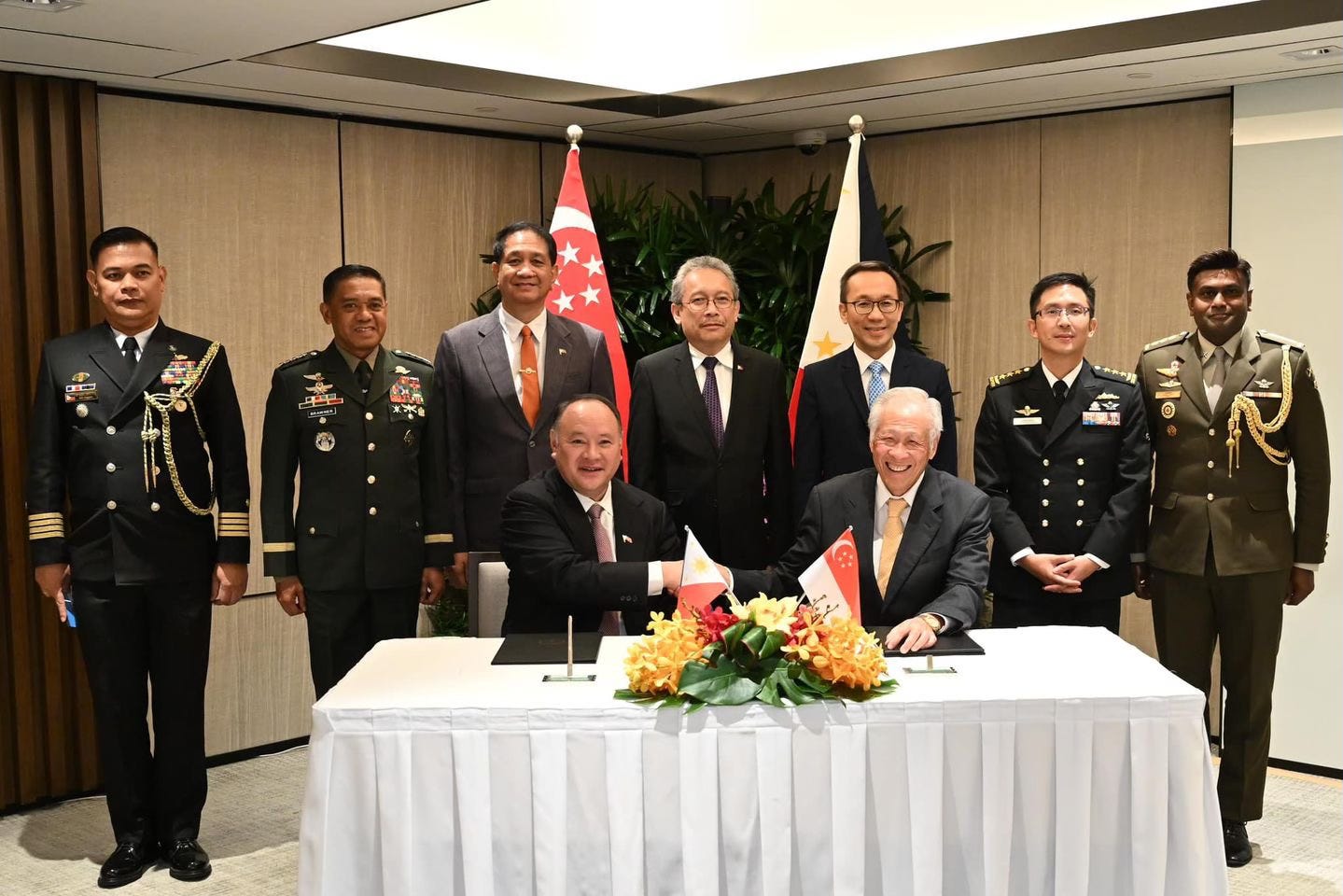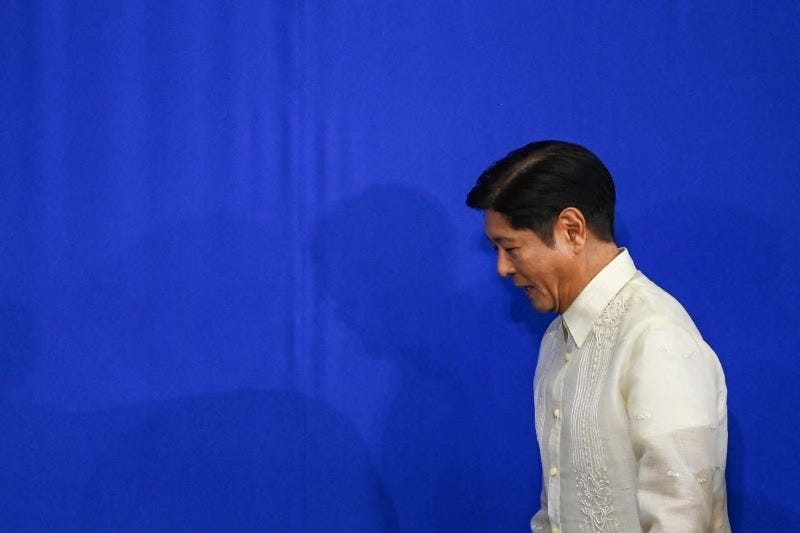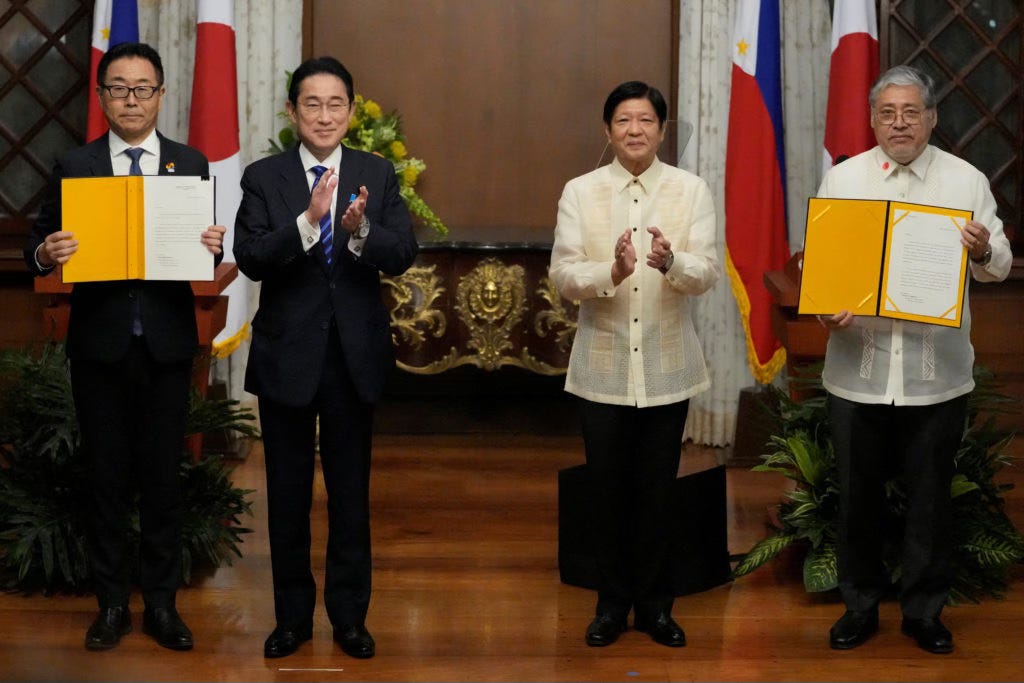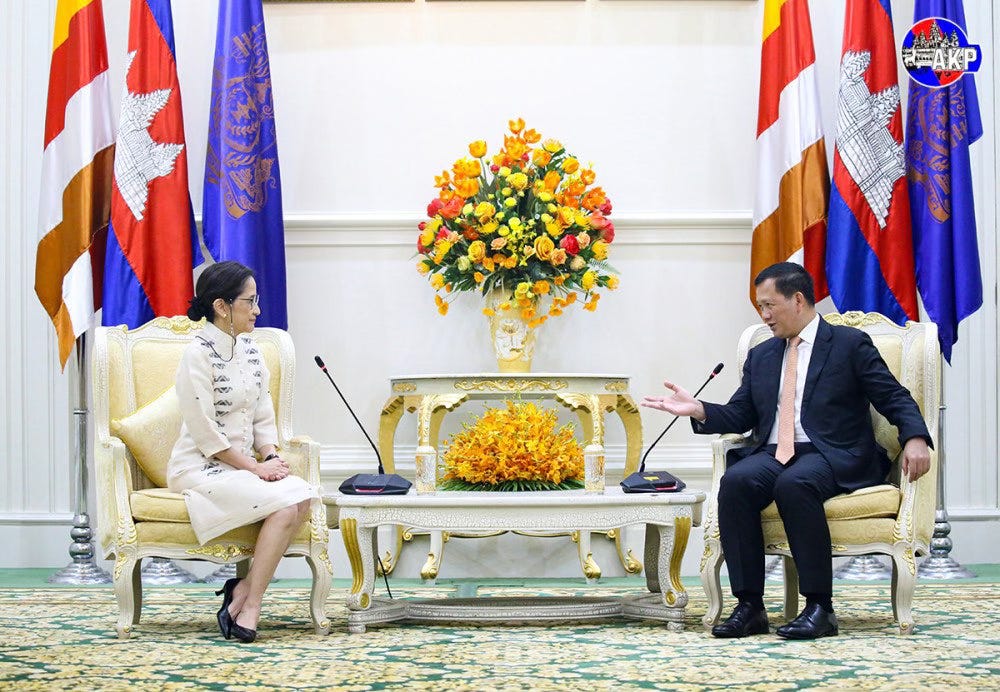Philippines Maritime Matrix
Philippines and Singapore broaden defense ties, Cambodia and the Philippines to strengthen and expand bilateral cooperation,
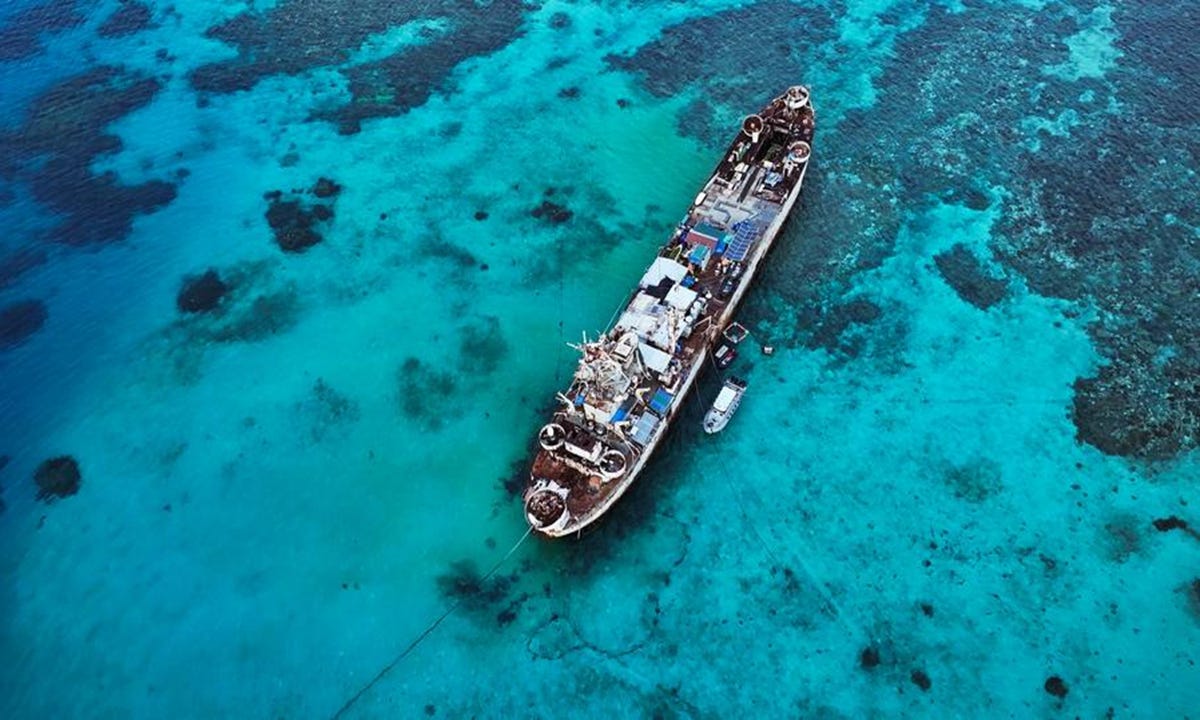
Actions speak louder than words as Manila reaches new S.China Sea deal with Beijing
By Ding Duo (Global Times)
According to the Chinese Foreign Ministry on Sunday, China and the Philippines reached an understanding on managing the situation at Ren'ai Jiao (also known as Ren'ai Reef) in the South China Sea. This is mainly related to the principles and practices that the Philippines needs to abide by when providing basic living supplies to the personnel on the warship illegally grounded at Ren'ai Jiao of China's Nansha Qundao (Nansha Islands) for a long time.
This is a progress made by the two sides in utilizing the bilateral consultation mechanism on the South China Sea issue to control the friction and avoid escalation of the crisis. It demonstrated that Beijing's comprehensive countermeasures against Manila's provocations in the region for more than a year are working in a sustained manner, resulting in the Philippines returning to direct negotiations and consultations.
Judging from the press release issued by the Chinese Foreign Ministry, China's position on managing the situation at Ren'ai Jiao has not changed. The Philippines has inevitably informed its ally -- the US, of the situation before the agreement with China was reached, and is expected to continue to keep Washington updated before further agreements are made. Seeing China and the Philippines make efforts to manage their conflicts in the South China Sea through institutionalized consultation, the US, which has long been "fanning the flames" and "fueling the fight" over the South China Sea issue, is inevitably not necessarily happy about this development.
The reason why an understanding can be reached is inextricably linked to the effective operation of the China-Philippines Bilateral Consultation Mechanism (BCM) on the South China Sea. Seven years ago, the two countries agreed to establish the BCM to conduct regular consultations on their respective concerns involving the South China Sea to avoid complicating and escalating the disputes as well as affecting the peace and stability of the South China Sea.
The new "deal" is a concrete manifestation of some consensus achieved by China and the Philippines. It also clearly shows that Manila's attempts to stir up trouble and exert pressure on China through "microphone diplomacy," "gray zone tactics" and "exposure strategy" on the South China Sea issue did not work, and that direct negotiation and consultation between the two countries concerned is the only way.
The new "deal" does not change the rights and wrongs of the maritime situation at Ren'ai Jiao. The reasons that led to the incident are clear: the Philippines broke its promise. Manila not only failed to tow away the illegally grounded warship, but also insisted on sending construction materials to this warship in an attempt to make large-scale reinforcement and then achieve permanent occupation of Ren'ai Jiao. The new "deal" does not recognize the legality and legitimacy of the Philippines' relevant activities, nor does it mean that the Philippines can "legalize" its actions at Ren'ai Jiao in the name of "exercising jurisdiction."
Over the years, China has exercised great restraint and patience in handling the situation at Ren'ai Jiao, and demonstrating goodwill and sincerity in managing maritime differences. During the previous administration of the Philippines, China and the Philippines reached a "gentleman's agreement" on the management and control of the situation at Ren'ai Jiao. After the current administration came to power, China has repeatedly notified and negotiated with high-level officials of the Philippine government on matters related to the "gentleman's agreement" and has kept on finding ways to manage differences with the Philippines through dialogue and consultation.
In September 2023, China invited the Envoy of the President to China for Special Concerns of the Philippines to Beijing for consultations. The two sides reached an internal understanding on how to manage and control the situation, which was approved by the Philippine leadership. In early 2024, China repeatedly negotiated with the Philippine side through diplomatic channels to reach a "new model" regarding the management and control of the situation at Ren'ai Jiao.
Given the fact that the Philippines once denied the "gentleman's agreement" of the previous government at the expense of disparaging the country's reputation, and also reneged on the internal understanding and "new model," China will look to what extent this new "deal" be seriously, completely and effectively implemented by the Philippines. If the Philippines abuses China's flexibility and patience based on the humanitarian spirit on the Ren'ai Jiao issue regarding the new agreement as an expedient, and then goes back on its word, it will definitely pay a heavier price for its repeated mistakes.
Read more here.
NB: The author is a deputy director of the Institute of Maritime Law and Policy at the National Institute for South China Sea Studies.
Philippines and Singapore broaden defense ties
The Philippines and Singapore signed a defense pact Wednesday that will allow their militaries to broaden their engagement, but few details were given about how the agreement could help address their security concerns in a region rife with conflicts.
By Jim Gomez (AP)
Defense Secretary Gilberto Teodoro Jr. signed the memorandum of understanding with his counterpart in Singapore, Ng Eng Hen, in a ceremony that coincided with the anniversary of the establishment of diplomatic ties between the two countries.
The agreement, which was not immediately made public, “serves as a framework to guide existing interactions and promote cooperation in areas of mutual interest such as military education and anti-terrorism,” Singapore’s Defense Ministry said in a brief statement.
It aims to “foster closer people-to-people links” and builds on an existing agreement on education, training aid and support activities for humanitarian assistance and disaster relief, the ministry added, without elaborating.
A Singaporean and two Philippine officials said the agreement is not a so-called status-of-forces agreement that the Philippines has signed with three countries, including the United States, which allows large-scale joint combat exercises.
It could allow joint but limited drills such as “tabletop exercises” simulating responses to humanitarian crises and natural disasters with agreed terms of engagement, according to the officials, who spoke on condition of anonymity because they were not authorised to discuss the matter publicly.
Philippine President Ferdinand Marcos Jr.’s administration has taken steps to forge new security alliances with a number of Asian and Western countries and allowed a U.S. military presence at more Philippine bases under a 2014 defense pact since territorial hostilities between China and the Philippines surged last year at two hotly disputed shoals in the South China Sea.
China has said such alliance-building and actions by the U.S. and its allies, including the Philippines, are provocative, aimed to contain Beijing and endanger regional security.
Teodoro has bristled at such Chinese criticism. He said in a speech in May that “terming these cooperative activities with like-minded nations as a containment or a provocation is disinformation and evidence of paranoia of a closed political system.”
In his state of the nation address before the Philippine Congress on Monday, Marcos stressed that his country would not back down in the territorial disputes but stressed his administration would only use peaceful means to resolve any dispute and would continue building security alliances with friendly countries.
“In the face of challenges to our territorial sovereignty, we will assert our rights and interests in the same fair and pacific way that we have always done,” Marcos said, adding that efforts were continuing “to strengthen our defense posture, both through developing self-reliance and through partnerships with like-minded states.”
Earlier this month, the Philippines and Japan signed a defense pact named the Reciprocal Access Agreement allowing the deployment of their forces in each other’s territory for joint military exercises as both countries face an increasingly assertive China.
Japan and the Philippines have separate maritime territorial disputes with China.
The agreement will take effect after it is ratified by the Philippine and Japanese legislatures.
The Philippines is holding separate talks with Canada, New Zealand and France on similar defense agreements, the two Philippine officials said.
Japan and the Philippines are treaty allies of the United States and their leaders held three-way talks in April at the White House, where President Joe Biden renewed Washington’s “ironclad” commitment to defend them.
Read more here.
Japan, Philippines sign defence pact with eyes on China
Agreement comes as Manila and Tokyo share concerns about Beijing’s growing assertiveness in the region.
By Aljazeera
Japanese Minister of Foreign Affairs Yoko Kamikawa and Philippine Secretary of National Defense Gilberto Teodoro signed the Reciprocal Access Agreement on Monday during a ceremony in Manila.
Under the agreement, Japanese forces will be able to deploy in the Philippines for joint military exercises and Filipino forces will be able to carry out combat training in Japan.
The pact will need to be ratified by both countries’ legislatures to come into effect.
The agreement comes as Japan and the Philippines, both long-standing allies of the United States, are wary of China’s growing assertiveness in the region.
Beijing has laid claim to more than 90 percent of the South China Sea, including waters that lie within the exclusive economic zones of the Philippines and four other Southeast Asian countries.
An international tribunal at the Hague in 2016 found that Beijing’s claims had “no legal basis”.
China and the Philippines’s coast guards and navies have been involved in numerous confrontations in the disputed waters, including an incident last month during which Chinese coast guard personnel wielding knives and spears used motorboats to ram two Philippine navy supply vessels.
Japan has a longstanding territorial dispute with China over the Senkaku Islands located between Taiwan and Okinawa.
Under Japanese Prime Minister Fumio Kishida, Tokyo has sought to boost its military firepower, including through reciprocal access agreements with Australia and the United Kingdom.
Philippine President Ferdinand Marcos Jr has forcefully denounced China’s actions in the South China Sea and warned that his country would consider the death of any Filipino at its hands as close to “an act of war”.
Manila has longstanding defence pacts with Australia and the US and is exploring a similar agreement with France.
In April, the leaders of the US, Japan, and the Philippines held their first trilateral summit in Washington, DC as part of efforts to boost military cooperation between the sides.
The summit came on the heels of joint military drills in the South China Sea that also included Australia.
Read more here.
Philippines stretches its Wings
Phnom Penh; Cambodia and the Philippines have discussed the strengthening and expansion of their bilateral cooperation in various fields, including economy and trade.
By C. Nika (AKP)
The discussion took place here at the Peace Palace this afternoon between Hun Manet, Prime Minister of Cambodia, and H.E. Ms. Flerida Ann Camille P. Mayo, Ambassador of the Philippines to Cambodia.
Both sides will continue their efforts to boost trade volume, agricultural exports, and the sectors of tourism by connecting direct flights from Cebu of the Philippines to Siem Reap of Cambodia, education, and construction.
Moreover, Samdech Thipadei Prime Minister and H.E. Ambassador discussed the continuation of cooperation in the fields of defence and security, such as conducting joint exercises, training and the fight against transnational crimes, especially online scams.
H.E. Ms. Flerida Ann Camille P. Mayo expressed her commitment to do her best to further strengthen and broaden the Philippine-Cambodian relations and cooperation during her diplomatic mission in Cambodia.
The Premier congratulated H.E. Ms. Flerida Ann Camille P. Mayo on her appointment as Ambassador to Cambodia, and wished her success in her diplomatic mission, emphasising that relevant ministries and institutions of the Royal Government of Cambodia are ready to work closely with H.E. Ambassador to foster the relationship and cooperation between the two ASEAN countries.
Read more here.




